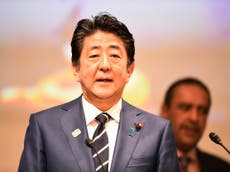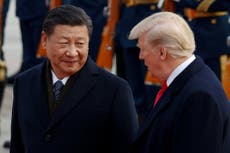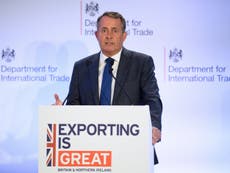Shinzo Abe's visit reminds the UK that our influence has been magnified inside the EU
Japan and the European Union have just signed an attractive trade deal. The UK cannot hope to secure as advantageous a bargain in the future
With a degree of understatement, the prime minister of Japan, Shinzo Abe, tells us that he has come to Downing Street because “I want to properly convey Japan’s thinking”.
We should be grateful to him for doing so. Usually reticent and unwilling to throw their considerable economic weight around, Japanese politicians and businesspeople are shy about commenting on other nation’s internal affairs and government policies. Not this time.
Representatives of Japanese business and diplomats were among the first to remind the British of the substantial inward investment made by more than 1,000 Japanese companies into the UK. Banks, carmakers, engineering firms and others have all made an outstanding contribution to the renaissance of British business over the past few decades.
They were attracted by many things: a flexible labour market and relatively harmonious industrial relations; liberalised capital markets and a global financial centre; skills; political and economic stability; and the English language as the international language of business. Above all, though, for many firms the main lure has been access to the largest single market in the world, in the European Union.
Since the first Nissan Bluebird rolled off the production line in Sunderland in 1986, to the £24bn purchase by SoftBank of Cambridge-based chip designer ARM a couple of years ago, Japanese companies have secured employment and decent wages for hundreds of thousands, if not millions, of people in the UK. Britain was Japan’s gateway into Europe, and billions of pounds of investment has been ploughed into this country, on the understanding that this would always be the case. With Brexit, that trust has now been breached. The Japanese feel it acutely.
Mr Abe will tell Ms May as much, and, though she hardly needs reminding, he will stress that frictionless access to the EU customs union and single market is essential to the continued presence of Japanese firms in the UK.
“Just-in-time” manufacturing – where components are supplied with minutes to spare to assembly lines, rather than being stockpiled – is, after all, a Japanese invention. Toyota, Honda and Nissan understand the needs of manufacturing better than windy Brexiteer Tory backbenchers. Whatever else, the economic fundamentals of EU membership must be preserved.
It has been spun that Mr Abe is “backing” Ms May’s deal with the EU for that very reason, though it cannot be completely true as the future trade relationship with the EU remains vague, framed only in some hopeful language in a “political declaration”.
Of course, Mr Abe wants to see the UK and Japan develop their trading and cultural relationships, and the lifting of the ban on UK exports of beef and lamb after 25 years is a token of that goodwill.
Liam Fox and the Department for International Trade are talking up the prospects of the UK joining the Trans-Pacific Partnership, and Mr Abe said at the G20 last year that Japan would welcome the UK “with open arms” into the free trade area which comprises most of the Pacific rim powers, with the notable exception of the United States.
Yet the importance of the UK to Japan is not primarily as a bit-part player in a trade organisation half a world away, but as its natural ally and partner in the European Union, as it has historically been. Much the same idea has traditionally ruled for most of the UK’s other trading partners, such as the US and China. The British enjoyed far more economic clout inside the EU, and as a bridge into it, than they can possibly hope to outside it.
Ironically, the EU-Japan partnership agreement has at last been finalised, a bargain between two of the world’s largest economic blocs. The UK cannot hope to secure as advantageous a deal in the future, despite the warm affection the Japanese may have for the British.
There has never been a barrier to the UK exporting more to Japan as a result of our membership of the EU. Today, under the new EU-Japan deal, cemented just as the British are botching their exit from the EU, tariffs and barriers have never been lower.
Germany has enjoyed huge success exporting to fast-growing markets such as China, again with its EU membership no impediment to success. Britain is already “global” as part of the EU; outside it will see its economic power and “soft” power diminished. Britain will be less “global”, and easier to ignore.
We see it already in many areas. When we try to intervene to help British citizens incarcerated in Iran, our voice carries less weight without the automatic addition of the 27 other members, and especially those of France and Germany. When we protest against the murder and attempted murder of British subjects in Wiltshire, our objections are heard more clearly in the Kremlin as part of this community of 28 – which may be one obvious reason why Vladimir Putin is a Brexiteer.
When Britain wishes to penalise the Saudi authorities for the assassination of Jamal Khashoggi, it has more effect with 500 million citizens behind it. For what it is worth – and it will of necessity not be a major taking point with Mr Abe – the British people’s deep distaste about the resumption of whaling will also be more sotto voce than it would have been had our economic and industrial relationship remained on a stable and secure footing.
Mr Abe, then, has a stake in Brexit, the same as the British do in the peace and security of east Asia and on restraining Kim Jong-un. We live in an interdependent world and the UK-Japan relationship is one of the most successful examples of globalisation.
We are two outward-looking, internationally minded, maritime and formerly imperial powers. Perched off the coast of huge continents, Japan and Britain are island nations that have long had to make their way in the world through enterprise and innovation, and co-operation. The British, however, seem to have forgotten some of those instincts. Mr Abe is right to remind us, if it is not too late.






Join our commenting forum
Join thought-provoking conversations, follow other Independent readers and see their replies